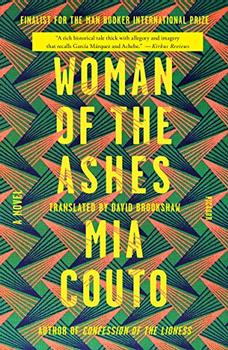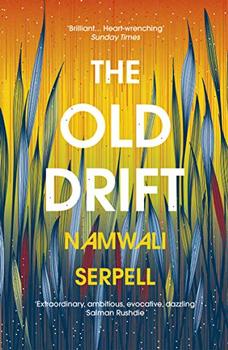Summary | Excerpt | Reviews | Beyond the book | Read-Alikes | Genres & Themes | Author Bio

A Sands of the Emperor Novel
by David Brookshaw, Mia CoutoMia Couto's Woman of the Ashes is the story of two people separated by the vast differences in their cultures: one, Portuguese Sergeant Germano de Melo, sent as a figurehead of colonial rule and a preserver of peace in a time of growing unrest; the other, Imani, a young girl of the VaChopi tribe who have chosen to side with the Portuguese against other local tribes. As the two build a tentative friendship, the demands of their respective responsibilities overwhelm them and the shadow of war grows ever closer.
Couto is clearly an accomplished historian. He spends a great deal of time building the setting and atmosphere of Mozambique in the 19th century, a time when Portugal was trying to colonize the African empire of Gaza (which extended across parts of modern-day Mozambique and Zimbabwe). He is also meticulous in his research on local traditions and beliefs. Many of these details don't go into depth, which leaves the reader curious – there are rebellions that are mentioned but never explored, conquests that beg for attention. The mark of good historical fiction is finding the right balance between adding authentic details, but not so many that the reader will be bogged down. Couto doesn't quite achieve this balance.
Although much of the narration in the novel focuses on the growing threat of war with the tribal king of Gaza, Ngungunyane (see Beyond the Book), this is never really the focus of the plot. The war comes and goes in the background, and it is the thoughts and experiences of Sergeant Germano de Melo and his young translator and friend, Imani, that take center stage. Both are lonely people, longing to find their place in the world. Both also straddle two worlds — that of colonial Portugal and colonized Mozambique – without ever being comfortable in either. As a result, the novel is extremely introverted, focused very much on the minutiae of everyday life instead of the larger historical events unfolding beyond these two households. Despite his clear understanding of the time and place of which he writes, Couto has a tendency to over-dramatize Imani and her family. There is a marked difference between her sections and those of the Sargeant; whereas de Melo's chapters are clearly and concisely narrated, Imani's are laden with every manner of aphorism. It's as if her belonging to a tribe automatically makes her speak in riddles and think in poetry. There is a line between infusing the narrative with relevant cultural detail and subscribing to clichés, Couto unfortunately crosses far into the latter region.
If you are someone who needs a strong plot to enjoy a novel, this particular story may not be for you. However, if you are comfortable with a slow build, deep and intimate characterization and many conflicting viewpoints, Woman of the Ashes will deliver. While not without some faults, Couto creates an interesting snapshot of Mozambique under Portuguese rule. He paints the various cultural and social crises that this situation presents, placing them in a larger historical context. This is a slow, thoughtful read that will make you eager to learn more.
![]() This review was originally published in The BookBrowse Review in May 2018, and has been updated for the
May 2019 edition.
Click here to go to this issue.
This review was originally published in The BookBrowse Review in May 2018, and has been updated for the
May 2019 edition.
Click here to go to this issue.

If you liked Woman of the Ashes, try these:

by David Diop
Published 2024
The hotly anticipated new novel by David Diop, winner of the International Booker Prize.

by Namwali Serpell
Published 2020
An electrifying debut from the winner of the 2015 Caine Prize for African writing, The Old Drift is the Great Zambian Novel you didn't know you were waiting for.
Happiness belongs to the self sufficient
Click Here to find out who said this, as well as discovering other famous literary quotes!
Your guide toexceptional books
BookBrowse seeks out and recommends the best in contemporary fiction and nonfiction—books that not only engage and entertain but also deepen our understanding of ourselves and the world around us.